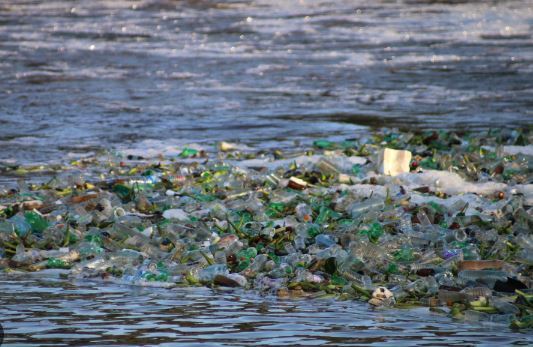BY ALEXANDER MAKUACH KUOL
Plastic pollution is reaching critical levels in the South Sudanese capital, Juba, especially in the Nile River, where plastic bottles, bags, and various debris are accumulating at an alarming rate. This situation poses severe environmental and public health risks, not only within Juba but throughout South Sudan. Public spaces and waterways, increasingly clogged with plastic waste, now endanger the well-being of city residents by contributing to unhygienic conditions and worsening disease outbreaks.
Plastic waste creates fertile grounds for disease-carrying pests, exacerbating malaria rates, which are already high across the country’s ten states and three administrative areas. The situation is particularly hazardous for communities relying on the Nile as a source of drinking water, where pollution from plastics and other waste contaminants increases the risk of waterborne diseases like cholera. If left unchecked, plastic pollution could lead to frequent disease outbreaks that would be difficult to control, given the city’s limited healthcare resources and rapid population growth.
The situation calls for both local and international intervention, as seen with Japan’s recent donation of 17 garbage collection trucks and various maintenance equipment to the Juba City Council. This support from the Japan International Cooperation Agency (JICA) includes waste compactors, dump trucks, and the establishment of a workshop to maintain the vehicles, which will aid in consistent waste collection efforts across the city. However, these resources can only go so far without policies that encourage responsible plastic use, recycling, and public cooperation.
South Sudan can look to its East African neighbors for effective solutions to plastic pollution. Rwanda, for example, has taken an aggressive approach, banned single-use plastics, and enforced strict penalties for violations, making Kigali one of Africa’s cleanest capitals. Kenya has also made strides with a range of policies, including recycling programs and designated smoking areas, which help to reduce both litter and air pollution in urban areas. These examples demonstrate how a structured approach to waste management, combined with a public commitment to cleanliness, can lead to a healthier, more sustainable environment.
Plastic pollution and the lack of proper waste management directly impact public health. Accumulating garbage in public spaces and waterways compromises water quality, while improper disposal of plastic waste leads to respiratory issues and aggravates conditions related to poor sanitation. With no intervention, Juba’s plastic problem is likely to escalate, impacting the lives of residents, disrupting the natural ecosystem, and creating economic burdens for local governments.

The situation demands both immediate responses and long-term solutions. In the short term, public awareness campaigns are critical for educating citizens on the dangers of plastic pollution and encouraging responsible waste disposal.
Clean-up drives along the Nile and in Juba’s public spaces would help mitigate immediate environmental hazards, while designated waste collection points throughout the city could make proper disposal more accessible. By initiating small-scale recycling projects, Juba could also begin turning plastic waste into usable materials, reducing the amount of litter and introducing new economic opportunities.
For sustainable, long-term change, Juba needs dedicated policies focused on limiting plastic usage and promoting recycling. A city-wide ban on single-use plastics would mirror the successful efforts of neighboring countries and serve as a bold statement against pollution.
Infrastructure expansion is equally crucial, more waste collection trucks, bins, and recycling centers across neighborhoods would discourage dumping in public spaces and rivers.
Public-private partnerships could help fund sustainable projects and bring in expertise from organizations focused on urban development and waste management. Designated smoking areas would also help reduce litter and manage air quality more effectively.
By implementing such solutions, Juba has the potential to transform its waste management systems, setting an example for other South Sudanese cities and creating a cleaner, healthier environment for all. Addressing plastic pollution in the capital is essential not only for public health but also as a testament to South Sudan’s commitment to a sustainable future. Through concerted efforts, partnerships, and policy development, Juba can rise to meet this challenge and pave the way for a cleaner, greener South Sudan.
The writer is a development professional with over a decade of service in the humanitarian sector in South Sudan. He has a background in Development Studies and International Relations and dedicated his career to addressing food security, economic challenges, and social issues affecting South Sudanese communities.
The views expressed in ‘opinion’ articles published by Radio Tamazuj are solely those of the writer. The veracity of any claims made is the responsibility of the author, not Radio Tamazuj.




